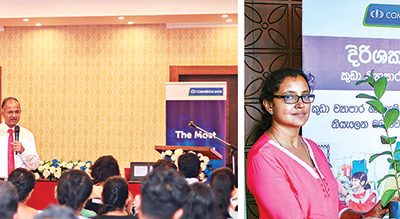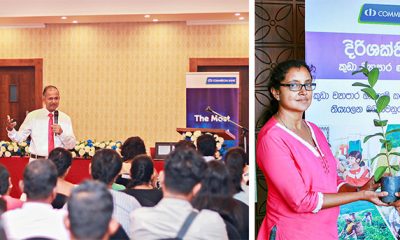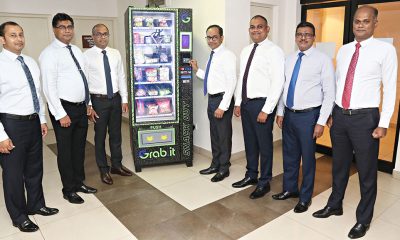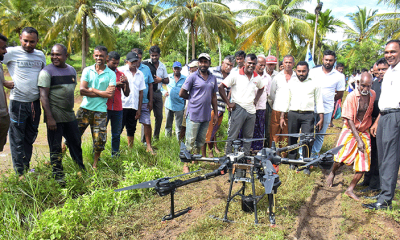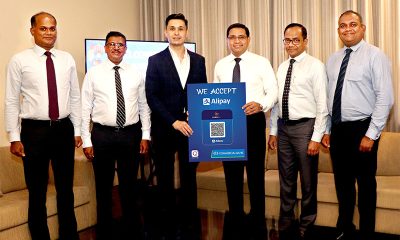Business
ComBank introduces breakthrough ‘Tap to Phone’ payments acceptance with PAYable
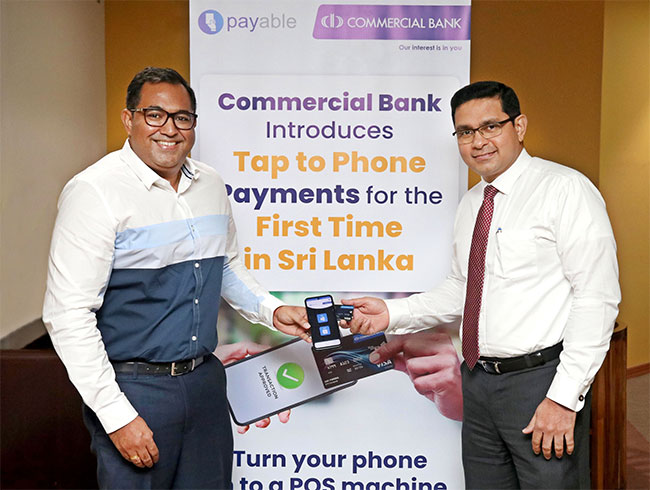
The Commercial Bank of Ceylon has become the first Sri Lankan Bank to introduce card acceptance through Android smartphones, allowing its merchants to conveniently and cost effectively accept card payment transactions, changing the landscape of the digital payment industry in Sri Lanka with this state-of-the-art low-cost technology.
The Bank has announced that it is providing this facility in collaboration with PAYable Pvt Ltd. one of Sri Lanka’s leading fintech and digital payment solutions providers, and has integrated its payment system with PAYable SoftPOS, also known as PAYableTAP, which was developed in partnership with Mastercard and Worldline, a technology company that provides digital payment platforms to the financial sector.
This solution converts any NFC-enabled Android smartphone into a payment acceptance terminal. To enjoy the convenience of this facility, merchants simply have to download the PAYableTAP app, register with Commercial Bank, and perform Tap and Pay transactions by simply allowing cardholders to tap their NFC enabled credit or debit cards on the screen of the device to make payments.
The first of its kind in Sri Lanka, the SoftPOS solution is built on cutting-edge, secure digital payment technology and is one of the easiest to use, the Bank said. Commercial Bank certified this new technology with card schemes, and the Bank guarantees the security of the smartphone POS transactions to be the same as traditional POS transactions.
Designed with an intuitive interface, PAYableTAP is operable in all three languages, and eliminates the need for printed receipts as digital receipts are generated after each transaction and sent via SMS or email to the customer. With its simplified payment acceptance methodology, many micro and small businesses are benefitted by enabling convenient and secure digital payments, which is imperative to their progress, the Bank said. It is also ideal for delivery-based businesses with large rider fleets and businesses that work seasonally or accept payments periodically.
In 2016, Commercial Bank also introduced the mobile unit named ‘Easy POS’ that operates on the PAYable app downloadable to merchants’ smartphones. Any merchant outlet that has a smartphone can acquire an ‘Easy POS’ device and accept card payments as the device communicates with smartphones via Bluetooth, and can be used anywhere and at any time provided the device and the phone are within range of each other.
PAYable Pvt Ltd. currently serves over 35,000 merchants across Sri Lanka. Established in 2016, the platform has grown to offer multiple card-present and online digital payment acceptance solutions, e-commerce solutions and support services that help merchants grow their businesses sustainably.
Sri Lanka’s first 100% carbon neutral bank, the first Sri Lankan bank to be listed among the Top 1000 Banks of the World and the only Sri Lankan bank to be so listed for 12 years consecutively, Commercial Bank operates a network of 268 branches and 940 automated machines in Sri Lanka. Commercial Bank is the largest lender to Sri Lanka’s SME sector and is a leader in digital innovation in the country’s Banking sector. The Bank’s overseas operations encompass Bangladesh, where the Bank operates 19 outlets; Myanmar, where it has a Microfinance company in Nay Pyi Taw; and the Maldives, where the Bank has a fully-fledged Tier I Bank with a majority stake.
Business
Russell’s Tea partners with Sri Lanka’s indigenous community

Allocates 4% of global sales for their socio-economic empowerment
Sri Lankan tea exporter Russell’s Tea (Pvt) Ltd achieved a historic milestone by signing a Memorandum of Understanding (MOU) to allocate 4% of its international sales revenue from ‘Russell’s Ceylon Ancestral Herbal Infusions’ toward the sustainable development of Sri Lanka’s indigenous community.
The company simultaneously launched five premium tea ranges—Ceylon Health and Wellness Teas, Ceylon Ancestral Herbal Infusions, Ceylon Fine Teas, Ceylon Organic Specialty Teas, and Ceylon Artisan Teas—to the global market, beginning with the UAE.
The MOU, formalizing the 4% revenue pledge, was signed by Russell’s Tea Director Jehan Perera and Vedda leader Uruwarige Wannila Aththo during a ceremony at Colombo’s Amari Hotel on Saturday. This agreement marks the first time the indigenous community will receive dollar-denominated compensation for sharing their ancestral knowledge of herbal remedies, which contributed to the development of Russell’s Ceylon Ancestral Herbal Infusions.
“Our R&D team drew significant inspiration from the Vedda community’s traditional wisdom on natural health benefits,” said Jehan Perera. “We believe it is our responsibility to reciprocate by supporting their socio-economic growth through this initiative.”
He added that the company plans to export the Community’s goods like wild honey in the future, further integrating the community into global markets.
Russell’s Tea has already secured partnerships with major UAE retailers, including the Lulu supermarket chain, with plans to expand across Gulf Cooperation Council (GCC) countries and Europe. All products, targeting luxury and tourism sectors, will be available in leading supermarkets by late June.
Celebrating its 38th anniversary, Russell’s Tea founder Russell Perera reflected on the company’s evolution: “From pioneering Sri Lanka’s corporate outdoor catering service to becoming a forex-earning exporter, this global launch symbolizes our commitment to innovation and national progress,” he said.
By Hiran Senewiratne
Business
Shyam takes helm at Sunshine Holdings as nephew succeeds uncle Vish in leadership transition

Under a Colombo sunset at the Taj Samudra, laughter, applause, and celebratory toasts recently marked the farewell of Vish Govindasamy, who stepped down from his executive role at Sunshine Holdings PLC after 28 years of transformative leadership.
The event, attended by business leaders, Sunshine’s senior team, and industry stakeholders, honoured his legacy as he transitioned to the Non-Executive Deputy Chairman role, while his nephew, Shyam Sathasivam, assumed the Group CEO position—a testament to the family bond steering this corporate evolution.
Sunshine Holdings announced that Govindasamy would continue in advisory capacity to ensure strategic continuity.
Govindasamy’s tenure which began in 1997 as CEO of Watawala Plantations, saw the Group expand into healthcare, consumer goods, renewable energy and dairy, while launching iconic brands such as Zesta, Watawala Tea, and Ran Kahata as well as Healthguard Pharmacy. Under his stewardship, Sunshine forged partnerships with global giants such as Wilmar and SBI Japan, earned recognition among Asia’s Best Workplaces, and championed social impact through the Sunshine Foundation for Good.
Shyam Sathasivam, Govindasamy’s nephew and successor, joined Sunshine in 2005 and has been integral to its recent growth. Having collaborated closely with his uncle for nearly two decades, Shyam emphasised his commitment to upholding the Group’s purpose-driven ethos: “Mr. Govindasamy nurtured a vision that blends business with heart. I am honored to build on this legacy, ensuring we continue to care for all stakeholders,” he stated at the farewell event.
During his address, Govindasamy observed attendees dispersed across the room and humorously underscored his attention to detail by remarking, “I kindly request everyone to assemble closer to the stage—such nuances catch my eye, a testament to my micro-management tendencies.” The lighthearted comment drew laughter while reflecting his reputed dedication to organizational precision.
Then shifting to the matter at hand and reflecting on his journey, Govindasamy acknowledged the Group’s resilience through Sri Lanka’s civil war and economic crises, expressing confidence in his nephew’s leadership: “Sunshine’s future is bright under Shyam. Our shared values and his forward-thinking approach will drive new heights,” he said.
The transition underscores a unique fusion of family trust and corporate strategy, positioning Sunshine Holdings for its next chapter.
By Sanath Nanayakkare
Business
Union Assurance is redefining financial literacy in Sri Lanka
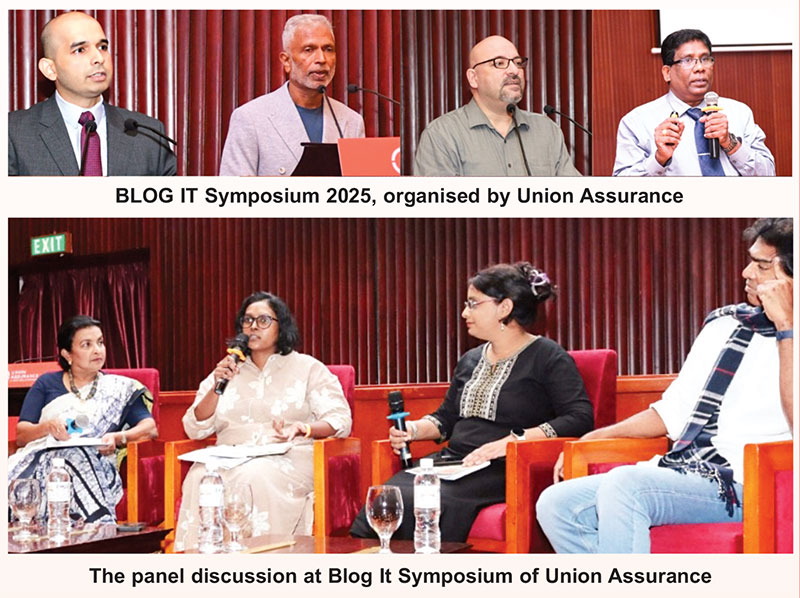
‘Blog It Symposium’
The ‘Blog It Symposium’ hosted by Union Assurance on March 27 at the BMICH, had drawn writers, students and professionals alongside literary giants like Ashok Ferrey. The event was less a corporate gathering and more a cultural movement, symbolising a quiet revolution in Sri Lanka’s journey toward financial empowerment.
Financial literacy, often confined to jargon-filled pamphlets or intimidating technical writeups, has found an unexpected ally in storytelling with Union Assurance’s Blog It initiative, launched years prior, which recognises a universal truth: people connect with stories, not statistics. By inviting bloggers and writers to explore themes like life insurance, savings, and generational wealth through personal narratives, the initiative transforms complex concepts into relatable tales. A mother’s account of securing her child’s education amid economic uncertainty, a young entrepreneur’s journey from debt to stability, or a retiree’s challenges in the rest of his or her life were the seeds of stories that resonated deeply with the writers in the audience especially because they are writing for a society whose financial planning is often overshadowed by day-to-day struggles.
Ashok Ferrey, the keynote speaker asked the audience,” Why do we write? “We write,” he suggested, “to express ourselves in ways that evade the rigid pathways of ordinary consciousness.” Imagine, he said, slipping into a disguise to go to a fancy dress party; that lets you be someone else. Writing, in Ferrey’s vision, operates similarly—it is a costume party for the psyche. “When we write, we shed the constraints of our daylight selves. The keyboard or pen becomes a mirror that reflects not who we are, but who we might invent,” he said.
“These aren’t just blogs,” remarked Lal Medawattegedara, novelist and symposium panelist. “They’re survival guides written in the language of the people.”
Rather than lecturing, Union Assurance has created a platform for dialogue. Winning entries, published in newspapers and shared across social media, turns anonymous writers into local influencers. A gem merchant from Ratnapura, whose blog on gem buying and selling would go viral, encouraging young people in the area to follow suit. A Colombo college student’s poem about her family’s medical debt would inspire a community savings drive. “Financial literacy isn’t about telling people what to do,” said Union Assurance CMO Mahen Gunarathna. “It’s about giving them the tools to write their own futures.”
As the 2025 symposium concluded, the message was clear: financial literacy is not a solo journey but a shared narrative.
In a world where money talks, Union Assurance has mastered a profound lesson: sometimes, the most powerful currency is a story well told. Sri Lankans are not just learning about finances—they’re rewriting their financial destinies with the support of Union Assurance.
By Sanath Nanayakkare
-

 Sports2 days ago
Sports2 days agoSri Lanka’s eternal search for the elusive all-rounder
-

 Features6 days ago
Features6 days agoCelebrating 25 Years of Excellence: The Silver Jubilee of SLIIT – PART I
-

 Business6 days ago
Business6 days agoCEB calls for proposals to develop two 50MW wind farm facilities in Mullikulam
-

 Business4 days ago
Business4 days agoAIA Higher Education Scholarships Programme celebrating 30-year journey
-

 News3 days ago
News3 days agoGnanasara Thera urged to reveal masterminds behind Easter Sunday terror attacks
-

 Features6 days ago
Features6 days agoNotes from AKD’s Textbook
-

 News2 days ago
News2 days agoComBank crowned Global Finance Best SME Bank in Sri Lanka for 3rd successive year
-

 Features2 days ago
Features2 days agoSanctions by The Unpunished


